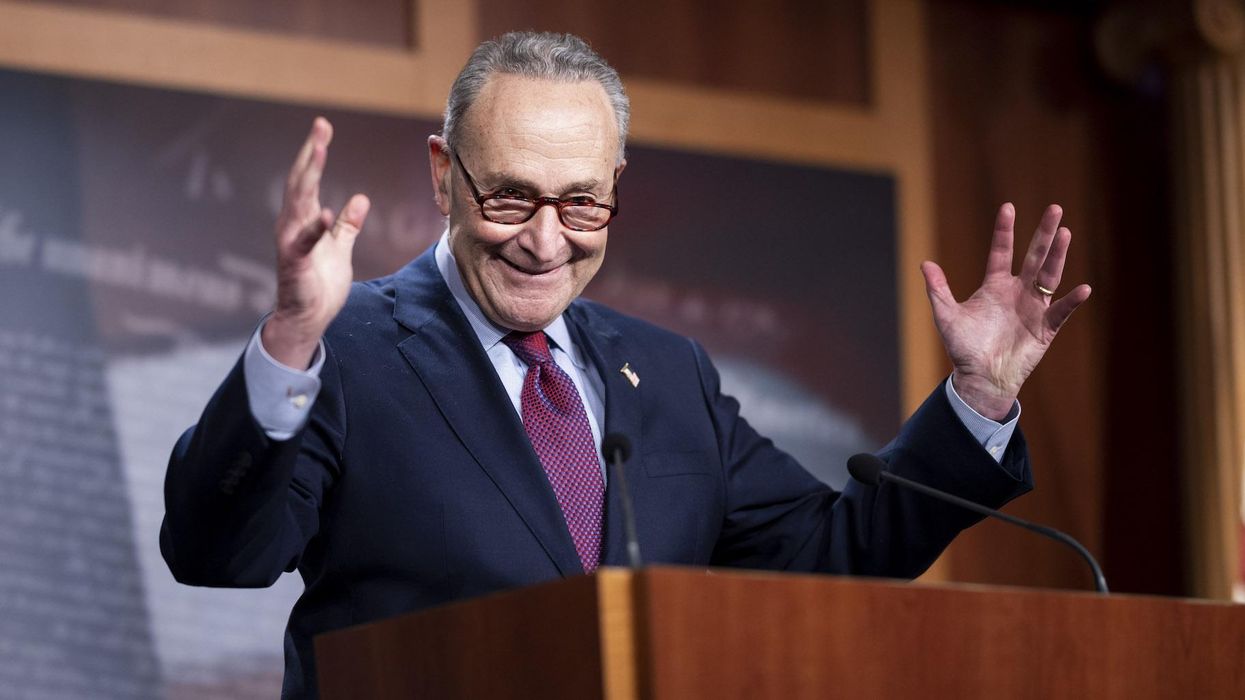
Ting Shen/Bloomberg via Getty Images

No reforms necessary
The massive COVID relief package Democratic Majority Leader Chuck Schumer (N.Y.) pushed through the Senate over the weekend has been repeatedly criticized for having more "pork" for lawmakers' non-pandemic priorities than for actual COVID relief for families and businesses impacted by government-imposed restrictions during the last year of the coronavirus.
One of those non-COVID priorities, the New York Times detailed recently, is a nifty little $86 billion bailout for failing union pensions — pensions that were falling apart long before the pandemic hit.
And the bailout isn't a loan to help the unions as they restructure or reform their plans — it's just $86 billion in cash, with no strings attached.
The Times revealed recently that the relief bill making its way through Capitol Hill includes a massive bailout for 185 multi-employer pension plans "that are so close to collapse that without the rescue, more than a million retired truck drivers, retail clerks, builders and others could be forced to forgo retirement income."
An "alarming number" of these plans, the Times said, are running out of funds — a problem that existed for years before the pandemic and "is a result of fading unions, serial bankruptcies and the misplaced hope that investment income would foot most of the bill so that employers and workers wouldn't have to."
According to the paper, the stimulus bill would give the weakest plans the funds to pay hundreds of thousands of union retirees their full pensions for the next three decades.
The great news for the unions is that they don't have to do anything — don't have to pay it back, freeze accruals, reform their system, or end their practices that led to the problem in the first place, which means, as the Times noted, their troubles could happen again. Also, the outlet reported, there is nothing in the bill that explains what happens when the tax money runs out in 30 years.
This type of no-strings-attached bailout is "almost unheard-of," the Times reported. Previous efforts to rescue these types of dying pension plans were in the form of 30-year Treasury loans or at least required some sort of reforms or cuts to some benefits.
Not only is the free money a new tactic, it's going to a growing group of more dangerous, shaky pension programs. From the Times:
The single-employer program is in good shape, but the multiemployer program is fragile. As of 2017, the country's 1,400 or so multiemployer pension plans had a total shortfall of $673 billion.
One huge Teamster plan, in particular, is expected to go broke in 2025, and when the pension agency starts paying pensions to its nearly 200,000 retirees, its multiemployer insurance program will go broke, too, according to the agency itself. That would leave the roughly 80,000 other union retirees whose pensions the agency now pays without their payouts.
The new legislation changes that. It calls for the Treasury to set up an $86 billion fund at the pension agency, using general revenues. The agency would be required to keep the money separate from the funds it uses for normal operations. It would use the new money to make grants to qualifying pension plans, allowing them to pay their retirees. The Congressional Budget Office estimated that 185 plans were likely to receive assistance, but as many as 336 might under certain circumstances.
The Democrats' union pension bailout will also restore pensions that were trimmed in a 2014 attempt to revive troubled plans, the Times said. That's six years before the pandemic that this relief package is supposed to address.
Critics have pointed out that the Democratic spending bill does nothing to change the mismanagement or poor structure of these pension plans.
Sen. Chuck Grassley (R-Iowa) attempted to get the pension bailout retooled during debate over the bill Friday, calling the Democrats' measure "a blank check" that "does nothing to address the root cause of the problem" and criticizing it as "totally unrelated to the pandemic." His efforts failed on the Senate floor, 49 to 50.
"Imagine that you have a college-aged kid who runs up $1,500 in credit card debt," James P. Naughton, an actuary now teaching at the University of Virginia's Darden School of Business, told the Times. "If you give him $1,500 and you don't do anything else, the odds that the problem is going to get fixed are pretty low."
"These [multi-employer] plans are uniquely unable to raise their contributions," Naughton added. "When things go well, the participants get the benefits. If things go badly, they turn to the government to make it work."
This story has been updated.